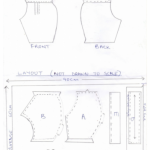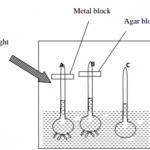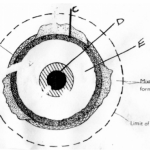KNEC KCSE English Paper 2 – 2014 Nakuru District Mock
2014 Nakuru District Mock
English Paper 2
1.COMPREHENSION (20 Marks)
Read the passage below and answer the questions that follow.
One good thing about music, Bob Marley sang in Trenchtown Rock, is when it hits you, you feel
no pain – but for South Africa’s apartheid regime, the opposite was true as it felt the wrath of
musicians who composed protest songs against its oppressive policies.
During the apartheid years, music was more than a solace – it was a “weapon of struggle” used
against the aggressor whose only recourse was to ban it from the airwaves, but never from the
hearts of the millions who were oppressed.
Music had always been used to soothe souls during sufferance and it is said that it is slavery that
gave birth to (heavy metal) rock when slaves used their shackles or tools to make music either to
entertain themselves or to irk their captors.
The separatist system that saw people like Nelson Mandela and other black South African leaders
jailed for dissidence gave rise to more protest music than ever before. And South Africa’s anti-apartheid musicians were so influential that their songs were not only banned, but they were also forced into exile. Mandela believes that these protest songs, together with those of non-South Africans, played a significant role in the collapse of apartheid and, indeed, his February 11, 1990 release from Robben Island.
“Artistes reach areas far beyond the reach of politicians. Art, especially entertainment and music,
is understood by everybody, and lifts the spirits and the morale of those who hear it,” Mandela
admitted after his release.
South Africa’s musicians like Hugh Masekela and the Mirima Makeba started the protest campaign
back in the late ‘50s and early ‘60s after leaving South Africa for the United States, where they
used music to highlight the desperate situation of their compatriots who were living under
oppressive rule in the townships back home.
The Musical campaigns against apartheid intensified internationally throughout the ‘70s and ‘80s
and saw the composition, production and performance of many a political song by musicians who
had never even set foot in African but were inspired to join the anti-apartheid bandwagon- with
some, like Paul Simon, even stirring controversy when he was accused of breaking the cultural
boycott against South Africa by touring the country and utilizing contributions from local acts.
But the beat never stopped. In the UK, The Specials released Free Nelson Mandela while in the
US, Gil Scott-Heron and Brian Jackson released protest classic Johannesburg off the album From
South Africa to South Carolina. Little Steven (and the Disciples of Soul), together with Artists
United Against Apartheid, conceived and produced Sun City Resort in one of South Africa’s so- called homelands where international Musical concerts were frequently held.
Adopted from Sunday Nation December 8th 2013.
(a) What type of music is the author referring to in the passage (1 mark) …………………………………………………………………………………………………………
……………………………………………………………………………………………………….
(b) According to the passage what were the contributions of the anti-apartheid musicians.
(2 marks)
…………………………………………………………………………………………………………
……………………………………………………………………………………………………….. …………………………………………………………………………………………………………
(c) Who are the international singers who joined the musical campaigns against apartheid. (3mark) …………………………………………………………………………………………………………
……………………………………………………………………………………………………….. ………………………………………………………………………………………………………….
(d) Artistes reach areas far beyond the reach of politicians (add a question) (1 mark) …………………………………………………………………………………………………………
……………………………………………………………………………………………………….
(e) Make notes on the titles of songs sung against the apartheid regime (4marks) …………………………………………………………………………………………………………
……………………………………………………………………………………………………….. ………………………………………………………………………………………………………… …………………………………………………………………………………………………………
……………………………………………………………………………………………………….. ………………………………………………………………………………………………………….
(f) Identify the setting of the passage (2 marks) ……………………………………………………………………………………………………….. …………………………………………………………………………………………………………
(g) Paraphrase the following sentence
“articles reach areas far beyond the reach of politicians. Art, especially entertainment and music
is understood by everybody, and it lifts the spirits and the morale of those who hear it “
(3 mark)
…………………………………………………………………………………………………………
……………………………………………………………………………………………………….. …………………………………………………………………………………………………………. …………………………………………………………………………………………………………
(h) Give this passage another title (1 mark) ……………………………………………………………………………………………………….
(i) Explain the meaning of the following words and phrases (3 marks)
(i) irk their captors ………………………………………………………………………………………………
(ii) dissidence ……………………………………………………………………………………………
(iii) stirring controversy ………………………………………………………………………………………….
20 marks
2.LITERATURE (25 Marks)
Read the following extract and answer the questions that follow.
RIVER AND THE SOURCE
“Good. Very good. How about this marriage business-don’t you think it is too soon? I mean you’re only worked for a year – do you really have anything to offer a wife?”
“I guess not. But then I doubt if a large house and a Mercedes Benz would make any difference to Wandia. She is not the kind of girl.”
“You can never tell. She is a Kikuyu after all; they have a thing about money. In any case, why don’t you wait a little? I am sure there is a nice Luo girl somewhere who’d make a perfect wife for you”
“Father,” Aoro struggled to control his voice. “Father, I don’t know anything about the rest
of the tribe, but I know Wandia. She is the one I have chosen. I love her – which is a feeling that I
cannot just transfer from one girl to another at will. In any case I have done anatomy and beneath t
he skin, everyone is remarkably the same. Even the blood which is supposed to be thicker than
water is all just a combination of iron and protein in every instance. Some people are good. Others
are bad – its got very little to do with their blood or tribe. It is all in the heart. I am sure you know
that father.”
Mark was silent for so long that his son feared that he would simply get up and walk away.
“You are my eldest son and whatever you may think I love you. I am proud of you. I want
you to be very happy. Even though you are a doctor – and I suppose doctors know a lot, there are
some things that are understood only by experience. I was only trying to forestall any possible
misery which may arise in future. Things like language to be spoken at home, the religion to be
practised – and by the way to what faith does she belong?
Questions
(a) Place this excerpt in its immediate context (4 marks) …………………………………………………………………………………………………….. ……………………………………………………………………………………………………….. …………………………………………………………………………………………………………. …………………………………………………………………………………………………………
(b) Illustrate any two themes brought out in this extract (4 marks) ……………………………………………………………………………………………………
……………………………………………………………………………………………………
……………………………………………………………………………………………………
…………………………………………………………………………………………………….. ………………………………………………………………………………………………………
(c) (i) I am sure there is a nice Luo girl somewhere who’d make a Perfect wife for you. (add a
question tag) (1 mark) ……………………………………………………………………………………………………
……………………………………………………………………………………………………
(ii) Explain the meaning of the word anatomy as used in the excerpt (1 mark) ……………………………………………………………………………………………………
……………………………………………………………………………………………………
(d) Comment on any TWO stylistic devices used in the excerpt (6 marks)
(i)…………………………………………………………………………………………………
……………………………………………………………………………………………………
……………………………………………………………………………………………………
(ii)…………………………………………………………………………………………………
………………………………………………………………………………………………………………………
……………………………………………………………………………………………………………………………………….
(e) Illustrate two aspects of Mark Sigu’s character shown in this excerpt (4 marks)
(i)…………………………………………………………………………………………………
……………………………………………………………………………………………………
(ii)…………………………………………………………………………………………………
……………………………………………………………………………………………………
(f) Where else in the novel is Aoro in conflict with his father? (2 marks) ……………………………………………………………………………………………………
……………………………………………………………………………………………………
……………………………………………………………………………………………………
(g) In about 40 words, explain how Aoro defends Wandia as his choice for a wife. (3 marks) ……………………………………………………………………………………………………
……………………………………………………………………………………………………
……………………………………………………………………………………………………
……………………………………………………………………………………………………
…………………………………………………………………………………………………..
25 marks
3.ORAL NARRATIVE. (20 Marks)
Read the Oral Narrative below and answer the questions that follow.
Read the poem below and answer the questions that follow
The earth does not get fat. It makes an end of those who wear the head plumes.
We shall die on the earth.
The earth does not get fat. It makes an
end of those who act swiftly as heroes
Shall we die on the earth?
Listen O earth. We shall mourn because of you.
Listen O earth. We shall die on the earth?
The earth does not get fat. It makes and an end of chiefs. Shall we die on the earth?
The earth does not get fat. It makes an end of the women chiefs
Shall we die on the earth?
The earth does not get fat. It makes an
end of the royal women
Shall we die on the earth?
Listen O earth. We shall mourn because of you.
Listen O earth. We shall die on the earth?
The earth does not get fat. It makes an end of the beast
Shall we die on the earth?
Listen you who are asleep, who are
left tightly closed in the land.
Listen you who are asleep, who are
Left tightly closed in the land.
Shall we all sink into the earth?
Listen O earth, the sun is setting tightly
We shall all enter into the earth.
(a). Identify the genre above (2 marks)
…………………………………………………………………………………………………………
………………………………………………………………………………………………………….
(b). Explain the functions of the above genre (4 marks) …………………………………………………………………………………………………………
…………………………………………………………………………………………………………. …………………………………………………………………………………………………………. …………………………………………………………………………………………………………
(c). Explain the meaning of the words, “The earth does not get fat” (2 marks) …………………………………………………………………………………………………………
…………………………………………………………………………………………………………. ………………………………………………………………………………………………………….
(d). Identify two aspects of style and comment on their effectiveness (6 marks) …………………………………………………………………………………………………………
…………………………………………………………………………………………………………. …………………………………………………………………………………………………………. …………………………………………………………………………………………………………
…………………………………………………………………………………………………………. …………………………………………………………………………………………………………. …………………………………………………………………………………………………………
(e). What is the speaker’s attitude towards the subject. (2 marks) …………………………………………………………………………………………………………. …………………………………………………………………………………………………………. …………………………………………………………………………………………………………
(f). Explain Two characteristics of the genre above (2 marks) …………………………………………………………………………………………………………. …………………………………………………………………………………………………………. …………………………………………………………………………………………………………
…………………………………………………………………………………………………………
(g) Under what circumstances is the genre likely to be performed and for what purpose? (2 marks) …………………………………………………………………………………………………………. …………………………………………………………………………………………………………. …………………………………………………………………………………………………………
…………………………………………………………………………………………………………
20 marks
4.GRAMMAR (15 Marks)
Answer the following questions.
Rewrite the following sentences according to the instructions after each
(i) You can do better than this. (Begin: This ……………………..) ………………………………………………………………………………………………
(ii) Having failed once, I do not want to fail again. (Begin. As………………………………) …………………………………………………………………………………………………
(iii) The teacher asked Kamau if he would go home that day or the following day. (Change to
direct speech) …………………………………………………………………………………………………
3 marks
Using the verbs in brackets, replace the underlined words and phrases with correct phrasal verbs
(i) The two friends met each other accidentally…………………………………..(run) in town
(ii) The city council askaries demolished …………………………………….kiosks in the city
Centre (bring)
(iii) Otieno visited ………………………….. us on his way to town (call)
3 marks
Complete each of the following sentences with the appropriate prepositions
(i) Many people think that manual labour is…………………………………their dignity
(ii) The judge was prejudiced………………………the accused from the beginning.
(iii) John has retired………………………………………private life.
3 marks
Supply one word which means the same as the underlined phrases in the following
sentences
(i) The man who broke into the house was finally arrested…………………………………..
(ii) The kitchen was filled with a pleasant smell from the day’s recipe ………………………..
2 marks
Explain the differences in meaning between the sentences in each of the pairs given below
I. I saw parents in the school library
II, I saw “parents” in the school library
…………………………………………………………………………………………………………. …………………………………………………………………………………………………………. …………………………………………………………………………………………………………
I. His brother who lives in Lamu is a mechanic
II. His brother, who lives in Lamu, is a mechanic …………………………………………………………………………………………………………. …………………………………………………………………………………………………………. …………………………………………………………………………………………………………
4 marks





